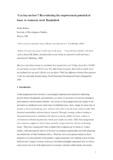| dc.contributor.author | Kabeer, Naila | |
| dc.coverage.spatial | Bangladesh | en |
| dc.date.accessioned | 2018-07-10T10:15:24Z | |
| dc.date.available | 2018-07-10T10:15:24Z | |
| dc.date.issued | 1998-01-25 | |
| dc.identifier.citation | Kabeer, N. (1998) Money Can't Buy Me Love? Re-evaluating Gender, Credit and Empowerment in Rural Bangladesh, IDS Discussion Paper 363, Brighton: IDS | en |
| dc.identifier.isbn | 1 85864 216 7 | |
| dc.identifier.uri | https://opendocs.ids.ac.uk/opendocs/handle/20.500.12413/13879 | |
| dc.description.abstract | Lending programmes for women have attracted a growing following in international development circles because they appear to hold out the promise of combining poverty reduction objectives with the goal of empowering women.
In Bangladesh, however, the country in which many of these programmes were pioneered, there have been a recent spate of highly contradictory evaluations of the impact of credit on women's lives in rural Bangladesh, very often of the same or broadly similar programmes. While some of these evaluations reiterate the finding that loans to women help them to improve their position within their households as well as in the broader community, others claim that women not only have not benefitted, but they may have also been left worse off.
This paper tracks down possible reasons for these very differing conclusions. It finds that they relate only partly to conflicting empirical findings. More significant sources of conflict relate to differences in the methodologies used, in the questions asked and, above all, in the models of power which underpin the various evaluations.
What appears to be common to all the evaluations, both positive and negative, is that they utilise an externally derived notion of empowerment rather than one which draws on the analysis of of the women loanees themselves and their own evaluations of what access to loans has meant. Consequently, the second half of the paper reports on an evaluation of the Small Enterprise Development Project in rural Bangladesh conducted by the author in early 1997 in which the impact of credit on the lives of loanees was assessed from the standpoint of mainly female, but also some male, loanees themselves.
A comparison of the 'outsider' and 'insider' perspectives on the impact of credit thrown up by these different evaluations is used in the concluding section of the paper to make some general points about the conceptualisation,evaluation and promotion of women's empowerment in the context of credit programmes. | en |
| dc.language.iso | en | en |
| dc.publisher | Institute of Development Studies | en |
| dc.relation.ispartofseries | IDS Discussion Paper;363 | |
| dc.rights.uri | http://www.ids.ac.uk/files/dmfile/IDSOpenDocsStandardTermsOfUse.pdf | en |
| dc.subject | Gender | en |
| dc.title | Money Can't Buy Me Love? Re-evaluating Gender, Credit and Empowerment in Rural Bangladesh | en |
| dc.type | IDS Discussion Paper | en |
| dc.rights.holder | Institute of Development Studies | en |
| dcterms.dateAccepted | 1998-01-25 | |
| rioxxterms.funder | Default funder | en |
| rioxxterms.identifier.project | Default project | en |
| rioxxterms.version | VoR | en |
| rioxxterms.funder.project | 9ce4e4dc-26e9-4d78-96e9-15e4dcac0642 | en |

